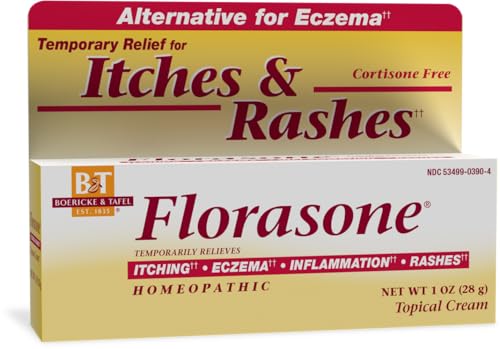
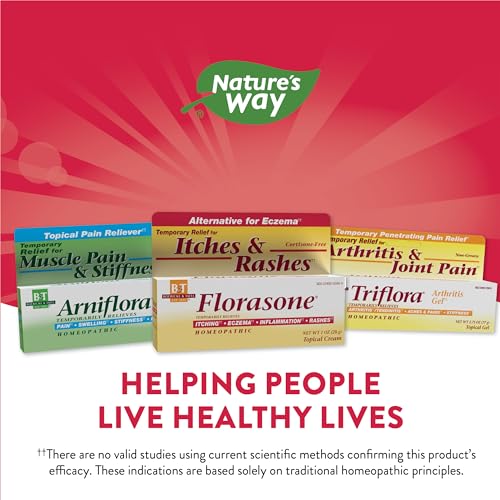
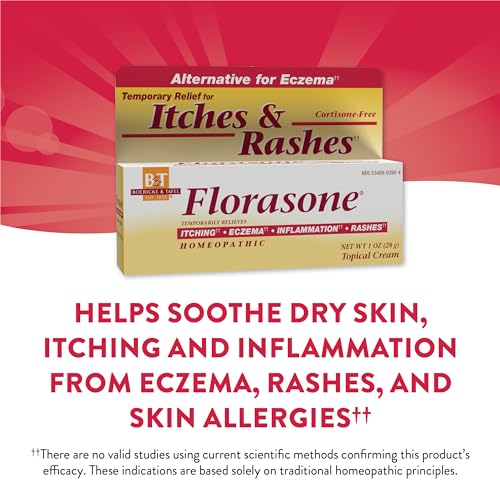

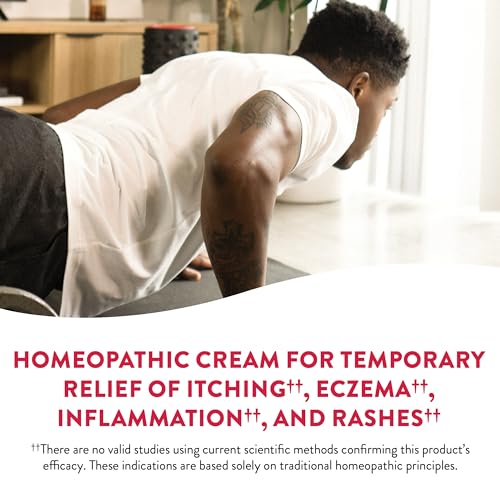
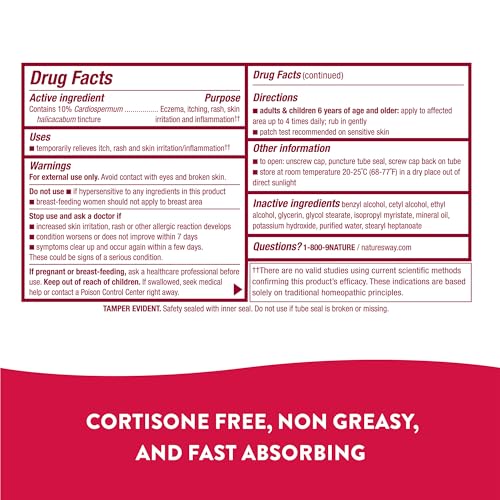
Boericke & Tafel Eczema Cream - Soothes Itching & Rashes, Fast-Absorbing - 4oz


Benzyl Alcohol
High RiskBenzyl alcohol is a naturally occurring and synthetic aromatic alcohol commonly used as a solvent, preservative, and fragrance ingredient in various products. It is found in both plant sources and as a synthetic compound, functioning primarily to maintain product stability and enhance fragrance profiles.
Sustai Insights
Benzyl alcohol serves effectively as a preservative and solvent, contributing to product stability and sensory qualities. However, it poses potential health risks, particularly as an allergen, with high concern for immunotoxicity. Environmental risks include being a pollutant with low bioaccumulation potential. Regulatory agencies have established restrictions on its use in certain products. Overall, the risk level associated with benzyl alcohol is assessed as high, necessitating careful consideration of its use and potential alternatives.
Potassium Hydroxide
High RiskPotassium hydroxide is a caustic inorganic base commonly used in various products for its ability to adjust pH levels and act as a cleaning agent. It is highly soluble in water and can produce heat upon dissolution, making it effective in certain formulations.
Sustai Insights
Potassium hydroxide serves as a strong pH adjuster and cleaning agent, but it poses significant health risks due to its caustic nature, which can cause irritation to skin and eyes. Environmental concerns include its potential to contribute to water pollution. Regulatory bodies have imposed strict usage restrictions due to these hazards, leading to a high-risk overall assessment. Safe handling practices are essential, and alternatives such as citric acid may provide safer pH adjustment without the associated risks.
Mineral Oil
Medium RiskMineral oil is a liquid mixture of hydrocarbon compounds derived from petroleum, commonly used in cosmetics and personal care products as an emollient and moisturizer. It functions by forming a barrier on the skin, preventing moisture loss and enhancing product texture.
Sustai Insights
Mineral oil offers functional benefits such as effective moisturization and skin barrier protection. However, it poses moderate health risks, including potential allergic reactions and concerns regarding its bioaccumulation and persistence in the environment. Regulatory bodies advise against excessive use due to these risks. Overall, the ingredient is assessed as medium risk, with recommendations for cautious application and consideration of safer alternatives.
Cetyl Alcohol
Low RiskCetyl alcohol is a long-chain organic alcohol commonly used in cosmetic formulations. It serves as an emollient, emulsifier, and thickening agent, enhancing the texture and stability of products. Cetyl alcohol is derived from natural sources, such as coconut or palm oil, and is often included in creams, lotions, and hair conditioners.
Sustai Insights
Cetyl alcohol offers functional benefits as an emollient and emulsifier, improving product texture and stability. It is biodegradable and sourced from renewable materials, contributing to sustainability. Health risks are minimal, with low concerns for carcinogenicity, allergies, or reproductive toxicity. Environmental impact is also low, with no significant pollutant or bioaccumulation potential. Regulatory bodies have not placed restrictions on its use, indicating a favorable safety profile. Overall, cetyl alcohol is assessed as low risk, and safe usage practices include ensuring proper formulation concentrations.
Glycol Stearate
Low RiskGlycol stearate is composed of ethylene glycol and stearic acid. It serves primarily as an emulsifier and thickener in cosmetic formulations, helping to stabilize and enhance the texture of products.
Sustai Insights
Glycol stearate exhibits functional benefits as an effective emulsifier, improving product stability and texture. It is generally recognized as having low health risks, with no significant concerns regarding carcinogenicity, allergies, or reproductive toxicity. Environmentally, it poses low risks with no significant pollutant potential or bioaccumulation. Regulatory agencies have not imposed significant restrictions on its use in cosmetics. Overall, it is assessed as low risk, making it a suitable ingredient in formulations. For those seeking alternatives, other natural emulsifiers may be considered.
Vegetarian Glycerin
Low RiskVegetarian glycerin, also known as glycerol, is a colorless, odorless, and viscous liquid derived from plant sources. It is primarily used as a humectant, solvent, and emollient in various personal care products, helping to retain moisture and improve texture.
Sustai Insights
Vegetarian glycerin offers functional benefits as an effective humectant, promoting hydration and skin smoothness. It is biodegradable and typically sustainably sourced. Health risks associated with glycerin are low, with no significant concerns for carcinogenicity, allergens, or reproductive toxicity. Environmental risks are minimal, and it is not subject to major regulatory warnings. Overall, the risk level for this ingredient is low, making it a safe choice in formulations. Safe usage practices include ensuring proper concentrations in products, and alternatives such as propylene glycol exist but may have differing properties.
Stearyl Heptanoate
Low RiskStearyl heptanoate is an ester derived from stearyl alcohol and heptanoic acid. It functions primarily as an emollient and skin-conditioning agent in cosmetic formulations, enhancing texture and moisture retention in products.
Sustai Insights
Stearyl heptanoate provides effective emollient properties, contributing to skin hydration and a smooth feel. It is generally regarded as having low health risks, with minimal concerns for carcinogenicity, allergies, or reproductive toxicity. Environmentally, it poses low risks, lacking bioaccumulation potential. Regulatory evaluations indicate no significant restrictions, supporting its safe use in personal care products. Overall, the ingredient is assessed as low risk, making it a viable option in cosmetic formulations.
Isopropyl Myristate
Low RiskIsopropyl myristate is composed of isopropyl alcohol and myristic acid. It functions primarily as an emollient, solvent, and skin penetration enhancer in cosmetic formulations. This ingredient is commonly found in creams, lotions, and other topical products to improve texture and absorption.
Sustai Insights
Isopropyl myristate offers functional benefits as an emollient and solvent, enhancing the texture and absorption of products. It is generally recognized as having low health risks, with no significant concerns regarding carcinogenicity, allergies, or reproductive toxicity. Environmentally, it poses minimal risks, not being classified as a pollutant or bioaccumulative. Regulatory bodies have not imposed significant restrictions, supporting its safe use in cosmetics. Overall, the risk level associated with isopropyl myristate is low, making it a generally safe ingredient in cosmetic formulations.
Cetyl Alcohol
Low RiskCetyl alcohol is a long-chain organic alcohol commonly used in cosmetic formulations. It serves as an emollient, emulsifier, and thickening agent, enhancing the texture and stability of products. Cetyl alcohol is derived from natural sources, such as coconut or palm oil, and is often included in creams, lotions, and hair conditioners.
Sustai Insights
Cetyl alcohol offers functional benefits as an emollient and emulsifier, improving product texture and stability. It is biodegradable and sourced from renewable materials, contributing to sustainability. Health risks are minimal, with low concerns for carcinogenicity, allergies, or reproductive toxicity. Environmental impact is also low, with no significant pollutant or bioaccumulation potential. Regulatory bodies have not placed restrictions on its use, indicating a favorable safety profile. Overall, cetyl alcohol is assessed as low risk, and safe usage practices include ensuring proper formulation concentrations.
Benzyl Alcohol
High RiskBenzyl alcohol is a naturally occurring and synthetic aromatic alcohol commonly used as a solvent, preservative, and fragrance ingredient in various products. It is found in both plant sources and as a synthetic compound, functioning primarily to maintain product stability and enhance fragrance profiles.
Sustai Insights
Benzyl alcohol serves effectively as a preservative and solvent, contributing to product stability and sensory qualities. However, it poses potential health risks, particularly as an allergen, with high concern for immunotoxicity. Environmental risks include being a pollutant with low bioaccumulation potential. Regulatory agencies have established restrictions on its use in certain products. Overall, the risk level associated with benzyl alcohol is assessed as high, necessitating careful consideration of its use and potential alternatives.
Glycol Stearate
Low RiskGlycol stearate is composed of ethylene glycol and stearic acid. It serves primarily as an emulsifier and thickener in cosmetic formulations, helping to stabilize and enhance the texture of products.
Sustai Insights
Glycol stearate exhibits functional benefits as an effective emulsifier, improving product stability and texture. It is generally recognized as having low health risks, with no significant concerns regarding carcinogenicity, allergies, or reproductive toxicity. Environmentally, it poses low risks with no significant pollutant potential or bioaccumulation. Regulatory agencies have not imposed significant restrictions on its use in cosmetics. Overall, it is assessed as low risk, making it a suitable ingredient in formulations. For those seeking alternatives, other natural emulsifiers may be considered.
Vegetarian Glycerin
Low RiskVegetarian glycerin, also known as glycerol, is a colorless, odorless, and viscous liquid derived from plant sources. It is primarily used as a humectant, solvent, and emollient in various personal care products, helping to retain moisture and improve texture.
Sustai Insights
Vegetarian glycerin offers functional benefits as an effective humectant, promoting hydration and skin smoothness. It is biodegradable and typically sustainably sourced. Health risks associated with glycerin are low, with no significant concerns for carcinogenicity, allergens, or reproductive toxicity. Environmental risks are minimal, and it is not subject to major regulatory warnings. Overall, the risk level for this ingredient is low, making it a safe choice in formulations. Safe usage practices include ensuring proper concentrations in products, and alternatives such as propylene glycol exist but may have differing properties.
Stearyl Heptanoate
Low RiskStearyl heptanoate is an ester derived from stearyl alcohol and heptanoic acid. It functions primarily as an emollient and skin-conditioning agent in cosmetic formulations, enhancing texture and moisture retention in products.
Sustai Insights
Stearyl heptanoate provides effective emollient properties, contributing to skin hydration and a smooth feel. It is generally regarded as having low health risks, with minimal concerns for carcinogenicity, allergies, or reproductive toxicity. Environmentally, it poses low risks, lacking bioaccumulation potential. Regulatory evaluations indicate no significant restrictions, supporting its safe use in personal care products. Overall, the ingredient is assessed as low risk, making it a viable option in cosmetic formulations.
Mineral Oil
Medium RiskMineral oil is a liquid mixture of hydrocarbon compounds derived from petroleum, commonly used in cosmetics and personal care products as an emollient and moisturizer. It functions by forming a barrier on the skin, preventing moisture loss and enhancing product texture.
Sustai Insights
Mineral oil offers functional benefits such as effective moisturization and skin barrier protection. However, it poses moderate health risks, including potential allergic reactions and concerns regarding its bioaccumulation and persistence in the environment. Regulatory bodies advise against excessive use due to these risks. Overall, the ingredient is assessed as medium risk, with recommendations for cautious application and consideration of safer alternatives.
Potassium Hydroxide
High RiskPotassium hydroxide is a caustic inorganic base commonly used in various products for its ability to adjust pH levels and act as a cleaning agent. It is highly soluble in water and can produce heat upon dissolution, making it effective in certain formulations.
Sustai Insights
Potassium hydroxide serves as a strong pH adjuster and cleaning agent, but it poses significant health risks due to its caustic nature, which can cause irritation to skin and eyes. Environmental concerns include its potential to contribute to water pollution. Regulatory bodies have imposed strict usage restrictions due to these hazards, leading to a high-risk overall assessment. Safe handling practices are essential, and alternatives such as citric acid may provide safer pH adjustment without the associated risks.
Isopropyl Myristate
Low RiskIsopropyl myristate is composed of isopropyl alcohol and myristic acid. It functions primarily as an emollient, solvent, and skin penetration enhancer in cosmetic formulations. This ingredient is commonly found in creams, lotions, and other topical products to improve texture and absorption.
Sustai Insights
Isopropyl myristate offers functional benefits as an emollient and solvent, enhancing the texture and absorption of products. It is generally recognized as having low health risks, with no significant concerns regarding carcinogenicity, allergies, or reproductive toxicity. Environmentally, it poses minimal risks, not being classified as a pollutant or bioaccumulative. Regulatory bodies have not imposed significant restrictions, supporting its safe use in cosmetics. Overall, the risk level associated with isopropyl myristate is low, making it a generally safe ingredient in cosmetic formulations.
Discover the soothing relief of Boericke & Tafel Florasone Cardiospermum Cream, a homeopathic eczema cream designed to provide comfort for itchy, inflamed skin. This non-greasy, fast-absorbing formula harnesses the power of Cardiospermum halicacabum, a tropical vine traditionally used for centuries to alleviate skin irritations. Perfect for adults and children over 2, it's an ideal solution for those seeking a natural remedy that prioritizes skin health and wellness.
- Natural Relief: Formulated with 10% Cardiospermum halicacabum tincture to soothe eczema, itching, and rashes.
- Gentle Application: Easy-to-use cream that absorbs quickly without leaving a greasy residue, making it perfect for daily use.
- Pleasant Experience: Features a light fragrance, enhancing the application experience while providing effective relief.
- Holistic Approach: Homeopathic and cortisone-free, offering a natural alternative for sensitive skin without harsh chemicals.
- Community Impact: Ethically crafted by Nature's Way Brands, committed to sustainability and responsible sourcing for a healthier planet.
Subscribe & Save with Sustai
- Best Price Guarantee: Always enjoy the lowest prices on sustainable home essentials.
- No Surprises: We’ll notify you before shipping. No hidden fees, ever.
- You’re in Charge: Change, pause, or cancel your subscription anytime with ease.
- Eco-Friendly Deliveries: Our grouped shipments mean less packaging and lower emissions.
Join us on a sustainable journey. Special offers for a limited time! Prices and promotions may change.
Recommended Products
Discover the soothing relief of Boericke & Tafel Florasone Cardiospermum Cream, a homeopathic eczema cream designed to provide comfort for itchy, inflamed skin. This non-greasy, fast-absorbing formula harnesses the power of Cardiospermum halicacabum, a tropical vine traditionally used for centuries to alleviate skin irritations. Perfect for adults and children over 2, it's an ideal solution for those seeking a natural remedy that prioritizes skin health and wellness.
- Natural Relief: Formulated with 10% Cardiospermum halicacabum tincture to soothe eczema, itching, and rashes.
- Gentle Application: Easy-to-use cream that absorbs quickly without leaving a greasy residue, making it perfect for daily use.
- Pleasant Experience: Features a light fragrance, enhancing the application experience while providing effective relief.
- Holistic Approach: Homeopathic and cortisone-free, offering a natural alternative for sensitive skin without harsh chemicals.
- Community Impact: Ethically crafted by Nature's Way Brands, committed to sustainability and responsible sourcing for a healthier planet.

You can have at most 2 Sustainable Steals products in your cart
Customer Reviews
Customers’ View
Customers appreciate the soothing relief provided by Nature's Way Eczema Cream, particularly valuing its natural ingredients and homeopathic formulation. Many users note its effectiveness in alleviating discomfort from rashes and irritations, with one customer mentioning its quick action against itching. The cream is praised for its non-greasy texture and pleasant scent, making it suitable for daily use. Environmentally conscious consumers also favor the product for its lack of harsh chemicals, aligning with a preference for more natural solutions. Overall, customers find this eczema cream to be a reliable option for managing skin issues while reflecting a commitment to health and wellness.
AI-generated from the text of customer reviewsThis product is rated 5.0 of 5.0 stars.
It has received 2 reviews.




